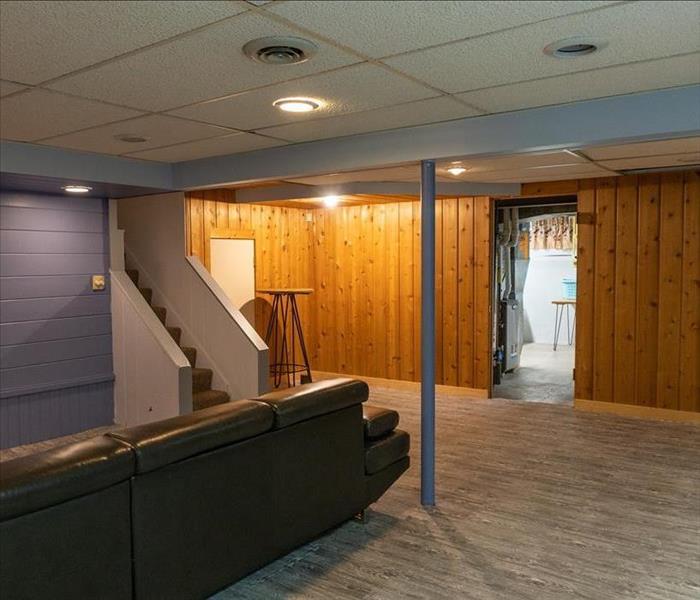5 Ways to keep your basement from flooding
4/7/2021 (Permalink)
Heavy rainfall can result in Smyrna basement flooding.
No one wants to come home to a flooded basement, but disasters don't come with a warning. When flooding occurs, your carpet will get soaked, and your furniture will be ruined. Worse of all, when left sitting, the basement will start to smell musty and damp.
You must be wondering how you could have prevented this from happening? How can you keep the water from overflowing your basement again? For those that live in flood-prone areas, this may be a source of considerable discomfort.
If you own a basement and are worried that it might become a victim of flooding when it rains heavily, then this is for you; read on, let's help you ease your worries.
How do storms cause basement flooding?
Basements are prone to flooding. Water seepage can flow through the foundation floor, windows, or walls from surface water sources or a storm sewer backup. In most cases in Georgia, we have seen groundwater flood the basement through a sump pump failure during a torrential downpour. Most sump pumps need electricity to function correctly. When a severe storm strikes a home's power supply, a sump pump will go out and leave a basement flooded.
Disasters can't be prevented if we don't know the reasons behind them. When it comes to basement flooding, here are the most common causes:
- Holes in the walls.
- Cracks in the foundation.
- Gaps in your window frames.
- Faulty or broken water pipes and sump pumps.
- Snow thaws, rainstorms. (any sort of moisture surrounding your home)
5 ways to prevent a basement flood
- Downspouts should be positioned so that water is redirected at least four feet away from the foundation of your house. If this is not possible with your current downspouts, try getting new extensions for a quick and straightforward way to avoid standing water from gathering around your house.
- Install flood sensors in your basement. You can always count on them to keep the basement dry with advanced features like moisture detection along with immediate alert notifications.
- Installation of a sump pump is an excellent idea for flood prevention, but only if they operate correctly. Sump pumps drain water from where it shouldn't be and then store it in a "sump basin."
- One promising way to prevent basement flooding is to ensure that water can't get in through the windows or foundation. Ensure that your windows are properly sealed; install good quality window covers and repair any flaws or cracks.
- Make sure that gutter maintenance is done at least four times a year. Gutter maintenance is one of the most important things when it comes to flood prevention. Clean your gutters regularly and remove any debris, leaves, etc.
What is flood mitigation?
In the restoration industry, mitigation is the method of minimizing the damage of a property due to the effects of a disaster. It applies to the 'clean-up' process following a natural disaster that leads to excess water.
Flood mitigation steps include:
- Assessing the situation.
- Removing water & moisture.
- Sanitizing & removing any hazardous material.
- Drying it to prevent any further damage and mold.
Flood mitigation also lowers the potential risk of flood damage to the structure and also decreases the severity of flood damage as it happens. It can include the purchase of flood insurance, the elevation of houses, installing a flood wall, etc.
What equipment is needed for flood mitigation?
Air movers and dehumidifiers have proven to be the best equipment to remove water and eliminate any moisture absorbed in surfaces. The flood mitigation process will typically take 3-5 days to achieve dry. To properly sanitize a flooded basement, you will need the help of a professional-grade antimicrobial. The professionals at SERVPRO prefer using the product Benefect.
Who to call for basement flooding?
In the industry, SERVPRO is a renowned company, and it has been serving clients since 1967. The team at SERVPRO of South Cobb is fully equipped with state-of-the-art commercial equipment and has years of experience restoring water damage in no time.
To make your life easier, we will work with your insurer and develop a mitigation plan to restore the structure. Your basement will be restored to a pre-water state. Our goal is for it to be hard to tell that there was ever water damage, to begin with. We understand how devastating a flooded basement can be, which is why we provide emergency service 24/7. Contact us today!

 24/7 Emergency Service
24/7 Emergency Service
